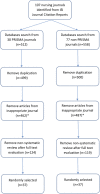Endorsement of PRISMA statement and quality of systematic reviews and meta-analyses published in nursing journals: a cross-sectional study
- PMID: 28174224
- PMCID: PMC5306529
- DOI: 10.1136/bmjopen-2016-013905
Endorsement of PRISMA statement and quality of systematic reviews and meta-analyses published in nursing journals: a cross-sectional study
Abstract
Objective: Systematic reviews (SRs) often poorly report key information, thereby diminishing their usefulness. Previous studies evaluated published SRs and determined that they failed to meet explicit criteria or characteristics. The Preferred Reporting Items for Systematic Reviews and Meta-Analyses (PRISMA) statement was recommended as a reporting guideline for SR and meta-analysis (MA), but previous studies showed that adherence to the statement was not high for SRs published in different medical fields. Thus, the aims of this study are twofold: (1) to investigate the number of nursing journals that have required or recommended the use of the PRISMA statement for reporting SR, and (2) to examine the adherence of SRs and/or meta-analyses to the PRISMA statement published in nursing journals.
Design: A cross-sectional study.
Methods: Nursing journals listed in the ISI journal citation report were divided into 2 groups based on the recommendation of PRISMA statement in their 'Instruction for Authors'. SRs and meta-analyses published in 2014 were searched in 3 databases. 37 SRs and meta-analyses were randomly selected in each group. The adherence of each item to the PRISMA was examined and summarised using descriptive statistics. The quality of the SRs was assessed by Assessing the Methodological Quality of Systematic Reviews. The differences between the 2 groups were compared using the Mann-Whitney U test.
Results: Out of 107 nursing journals, 30 (28.0%) recommended or required authors to follow the PRISMA statement when they submit SRs or meta-analyses. The median rates of adherence to the PRISMA statement for reviews published in journals with and without PRISMA endorsement were 64.9% (IQR: 17.6-92.3%) and 73.0% (IQR: 59.5-94.6%), respectively. No significant difference was observed in any of the items between the 2 groups.
Conclusions: The median adherence of SRs and meta-analyses in nursing journals to PRISMA is low at 64.9% and 73.0%, respectively. Nonetheless, the adherence level of nursing journals to the PRISMA statement does not significantly vary whether they endorse or recommend such a guideline.
Keywords: PRISMA; STATISTICS & RESEARCH METHODS; Systematic Review and meta-analyses.
Published by the BMJ Publishing Group Limited. For permission to use (where not already granted under a licence) please go to http://www.bmj.com/company/products-services/rights-and-licensing/.
Conflict of interest statement
Conflicts of Interest: None declared.
Similar articles
-
Reporting Quality of Systematic Reviews and Meta-Analyses of Otorhinolaryngologic Articles Based on the PRISMA Statement.PLoS One. 2015 Aug 28;10(8):e0136540. doi: 10.1371/journal.pone.0136540. eCollection 2015. PLoS One. 2015. PMID: 26317406 Free PMC article. Review.
-
Exploring reporting quality of systematic reviews and Meta-analyses on nursing interventions in patients with Alzheimer's disease before and after PRISMA introduction.BMC Med Res Methodol. 2018 Nov 29;18(1):154. doi: 10.1186/s12874-018-0622-7. BMC Med Res Methodol. 2018. PMID: 30497417 Free PMC article.
-
Epidemiology, quality, and reporting characteristics of systematic reviews and meta-analyses of nursing interventions published in Chinese journals.Nurs Outlook. 2015 Jul-Aug;63(4):446-455.e4. doi: 10.1016/j.outlook.2014.11.020. Epub 2014 Dec 4. Nurs Outlook. 2015. PMID: 26187084 Review.
-
Quality of reporting of systematic reviews and meta-analyses in emergency medicine based on the PRISMA statement.BMC Emerg Med. 2019 Feb 11;19(1):19. doi: 10.1186/s12873-019-0233-6. BMC Emerg Med. 2019. PMID: 30744570 Free PMC article.
-
Reporting and methodological quality of systematic reviews in the orthopaedic literature.J Bone Joint Surg Am. 2013 Jun 5;95(11):e771-7. doi: 10.2106/JBJS.L.00597. J Bone Joint Surg Am. 2013. PMID: 23780547
Cited by
-
Completeness of Reporting in Diet- and Nutrition-Related Randomized Controlled Trials and Systematic Reviews With Meta-Analysis: Protocol for 2 Independent Meta-Research Studies.JMIR Res Protoc. 2023 Mar 23;12:e43537. doi: 10.2196/43537. JMIR Res Protoc. 2023. PMID: 36951931 Free PMC article.
-
Restrictions and their reporting in systematic reviews of effectiveness: an observational study.BMC Med Res Methodol. 2022 Aug 20;22(1):230. doi: 10.1186/s12874-022-01710-w. BMC Med Res Methodol. 2022. PMID: 35987985 Free PMC article.
-
Is the information of systematic reviews published in nursing journals up-to-date? a cross-sectional study.BMC Med Res Methodol. 2017 Nov 25;17(1):151. doi: 10.1186/s12874-017-0432-3. BMC Med Res Methodol. 2017. PMID: 29178832 Free PMC article.
-
Systematic review and meta-analyses of studies analysing instructions to authors from 1987 to 2017.Nat Commun. 2021 Oct 5;12(1):5840. doi: 10.1038/s41467-021-26027-y. Nat Commun. 2021. PMID: 34611157 Free PMC article.
-
Perception of the Preferred Reporting Items for Systematic Reviews and Meta-Analyses (PRISMA) statement of authors publishing reviews in nursing journals: a cross-sectional online survey.BMJ Open. 2019 Apr 20;9(4):e026271. doi: 10.1136/bmjopen-2018-026271. BMJ Open. 2019. PMID: 31005930 Free PMC article.
References
-
- Light RJ, Pillemer DB. Summing up: the science of reviewing research. Cambridge, MA: Harvard University Press, 1984.
-
- Mullen PD, Ramirez G. Information synthesis and meta-analysis. Advances in health education and promotion. Greenwich: Jai Press, 1986.
Publication types
MeSH terms
LinkOut - more resources
Full Text Sources
Other Literature Sources
Research Materials

